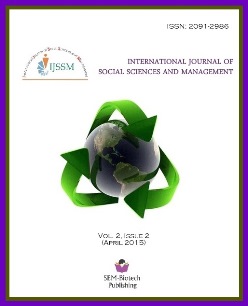Scale-up potentialities of some social safety net programmes to climate change shocks in Bangladesh
DOI:
https://doi.org/10.3126/ijssm.v2i2.11618Keywords:
Chars Livelihood Programme, Food-for-Work, Rural Employment and Road Maintenance Programme, Social Safety Net, Vulnerable Group DevelopmentAbstract
Although Bangladesh is quite advanced in terms of setting up systems of social safety net (SSN) but the services in dealing climate change has gained little attention. On the other hand some specific public SSN programmes (SSNPs) like Vulnerable Group Development (VGD), Food-For-Work (FFW), Rural Employment and Road Maintenance Programme (RERMP) and Chars Livelihood Programme (CLP) through which most distressed and right less poor especially vulnerable rural women are benefitted, not yet tested whether the programmes promoted as climate proofed. Therefore the study was conducted for adapting those four SSNPs in dealing with climate change shocks like cyclone, flood, drought, water logging and salinity for escaping climate vulnerable poor from chronic poverty. Quantitative analysis has been made using the Household Income and Expenditure Survey (HIES) 2010 data set. Focus Group Discussion (FGD), Participatory Rural Appraisal (PRA) session and Case Studies were performed for addressing current SSNPs with their weaknesses or effectiveness and scale up potentialities to explore better livelihood and food security options for climate poor. Relevant stakeholders in government and NGO programmes have been consulted to assess the feasibility of options for further strengthening of aforesaid SSNPs. It is found that the SSN intervention with VGD, FFW and RERMP have minimum scope in dealing with climate change although the said tools are important especially to disadvantaged rural women for creating their employment opportunity as well as poverty alleviation. The VGD beneficiaries can properly be engaged to sustainable income generation and microfinance activities for future saving to promote adaptive capacity which would enhance their resiliencies to cope with climate change. The dead or silted-up rivers, canals or ponds and irrigation channels can be excavated or re-excavated by operating the major workfare SSNPs like FFW and the excavated soil can be utilized for creating, maintaining or elevating rural roads, embankment and other infrastructures which are quite crucial for mitigating the flood, storm surge, water logging or salinity issues. The canals or ponds can additionally be utilized for enough harvesting of monsoon rain or flood water thus salinity and drought problems would be minimized for a better agricultural intervention in the affected areas. The RERMP beneficiaries can be engaged to maintain embankments and tree plantation at pond periphery or at barren land with their proper nursing, compost preparation etc. The CLP is found as a concrete example for achieving climate change adaptation to uplift the socio-economic status of chronic poor char dwellers to recurrent floods in Jamuna and Brahmaputra basins. This programme can be extended from an 18-month to a two-year period and should have to spread-up to the chars of other vulnerable flood prone areas of Bangladesh. A good agricultural marketing system is also essential for proper and timely marketing of CLP-products in the locality.
DOI: http://dx.doi.org/10.3126/ijssm.v2i2.11618
Int. J. Soc. Sci. Manage. Vol-2, issue-2: 78-92
Downloads
Downloads
Published
How to Cite
Issue
Section
License
This license enables reusers to distribute, remix, adapt, and build upon the material in any medium or format for noncommercial purposes only, and only so long as attribution is given to the creator.




